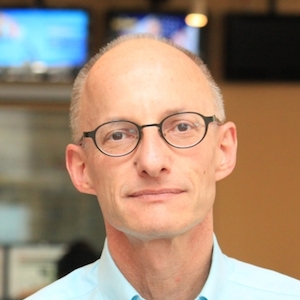What do I think 2014 will bring for the future of news?
You can detect the near-term future in what we can see with our own eyes right now. When I was an editor at The New York Times, I gradually watched the newspapers on my morning train commute give way to smartphones and tablets. The opportunities that created were vast (viz The Times’s digital subscriptions and incredible interactives), but so was the new competition (viz Fruit Ninja and Candy Crush, as well as The Guardian and Mail Online).
 Now that I’m a public radio suit, vice president for news at WNYC, what I can see is that every other person — or more, maybe — is commuting with earbuds in. The competition is abundant (viz Robin Thicke or last night’s episode of Homeland), yet the opportunity for those of us who tell our stories in audio form is just as real.
Now that I’m a public radio suit, vice president for news at WNYC, what I can see is that every other person — or more, maybe — is commuting with earbuds in. The competition is abundant (viz Robin Thicke or last night’s episode of Homeland), yet the opportunity for those of us who tell our stories in audio form is just as real.
So I predict that what you’ll be seeing in 2014 is that forward-thinking radio news organizations will be making an all-out assault on the earbud-wearing masses. You can call that a “mobile-first audio strategy”; I’m sure there are PowerPoint slides out there somewhere that do. But what it means is that our news reports and stories increasingly will be produced and packaged in forms divorced from the formats dictated by a radio clock.
Big audiences still want to listen to an hour of Morning Edition or All Things Considered, but a whole other big audience wants to hear news stories and talk-show segments as standalone reports: in our app or some other audio app, directly in their Twitter feed, in playlists of their own creation or playlists generated by an algorithm that takes into account their listening habits. That means that, as producers, we will need to create new formats and develop new workflows so that our reporting quickly — and satisfyingly — reaches listeners who don’t already listen to us on the radio or download our podcasts, like On the Media or New Tech City.
I guess I’m predicting more work for me and my colleagues. But I’m also predicting bigger audiences than ever for high-quality audio journalism.
Jim Schachter is vice president of news at WNYC in New York.